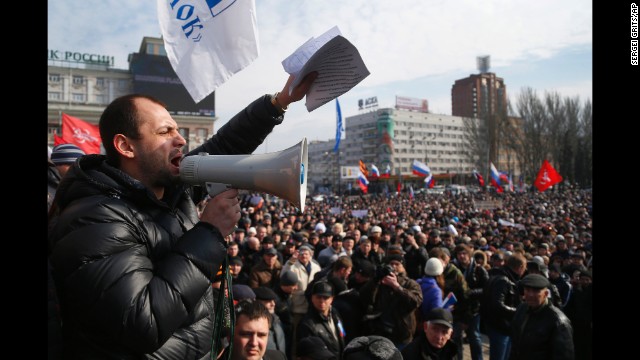 People shout slogans during a pro-Russia rally in Donetsk, Ukraine, on Sunday, March 9. Pro-Russian forces have taken control of Ukraine's autonomous Crimean region, prompting criticism from Western nations and the Ukrainian interim government. The standoff has revived concerns of a return to Cold War relations.
People shout slogans during a pro-Russia rally in Donetsk, Ukraine, on Sunday, March 9. Pro-Russian forces have taken control of Ukraine's autonomous Crimean region, prompting criticism from Western nations and the Ukrainian interim government. The standoff has revived concerns of a return to Cold War relations.  Ukrainian police detain a demonstrator during a pro-Russian rally in Donetsk on March 9.
Ukrainian police detain a demonstrator during a pro-Russian rally in Donetsk on March 9.  Pro-Russia protesters remove a Ukrainian flag from a flagpole taken from a government building in Donetsk on March 9.
Pro-Russia protesters remove a Ukrainian flag from a flagpole taken from a government building in Donetsk on March 9.  Cossacks and other pro-Russian forces stand guard outside a government building in Simferopol, Ukraine, Crimea's capital, on Saturday, March 8.
Cossacks and other pro-Russian forces stand guard outside a government building in Simferopol, Ukraine, Crimea's capital, on Saturday, March 8.  Ukrainian soldiers load armored personnel carriers into boxcars in the western Ukrainian city of Lviv on March 8.
Ukrainian soldiers load armored personnel carriers into boxcars in the western Ukrainian city of Lviv on March 8.  Armed men believed to be Russian military march in the village outside Simferopol on Friday, March 7.
Armed men believed to be Russian military march in the village outside Simferopol on Friday, March 7.  Pro-Russia protesters demonstrate outside the Belbek Air Base outside Sevastopol, Ukraine, on Thursday, March 6.
Pro-Russia protesters demonstrate outside the Belbek Air Base outside Sevastopol, Ukraine, on Thursday, March 6.  A Ukrainian navy officer looks at the scuttled, decommissioned Russian vessel Ochakov from the Black Sea shore outside the town of Myrnyi, Ukraine, on March 6. Russian naval personnel scuttled the ship, blockading access for five Ukrainian naval vessels.
A Ukrainian navy officer looks at the scuttled, decommissioned Russian vessel Ochakov from the Black Sea shore outside the town of Myrnyi, Ukraine, on March 6. Russian naval personnel scuttled the ship, blockading access for five Ukrainian naval vessels.  A member of the Russian military patrols around Perevalne, Ukraine, on March 6.
A member of the Russian military patrols around Perevalne, Ukraine, on March 6.  Servicemen guard a checkpoint at a Ukrainian Navy base in Perevalnoe, Crimea, on March 6.
Servicemen guard a checkpoint at a Ukrainian Navy base in Perevalnoe, Crimea, on March 6.  Ukrainian troops guard the Belbek air base outside Sevastopol, Ukraine, on March 6.
Ukrainian troops guard the Belbek air base outside Sevastopol, Ukraine, on March 6.  A woman walks past barricades on March 6 that were set up by anti-government protesters in Kiev's Independence Square.
A woman walks past barricades on March 6 that were set up by anti-government protesters in Kiev's Independence Square.  A sailor guards the Ukrainian Navy ship Slavutych in the Bay of Sevastopol on Wednesday, March 5.
A sailor guards the Ukrainian Navy ship Slavutych in the Bay of Sevastopol on Wednesday, March 5. 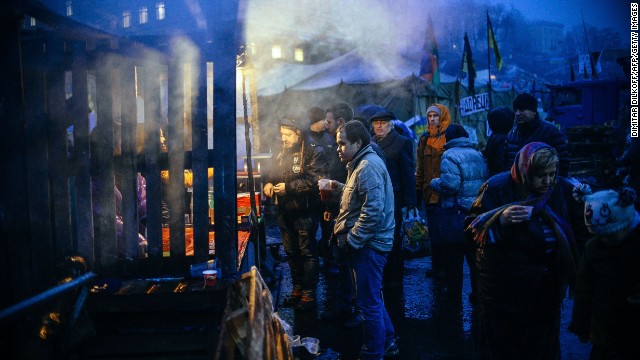 People wait in line for food distribution in Independence Square on March 5.
People wait in line for food distribution in Independence Square on March 5. 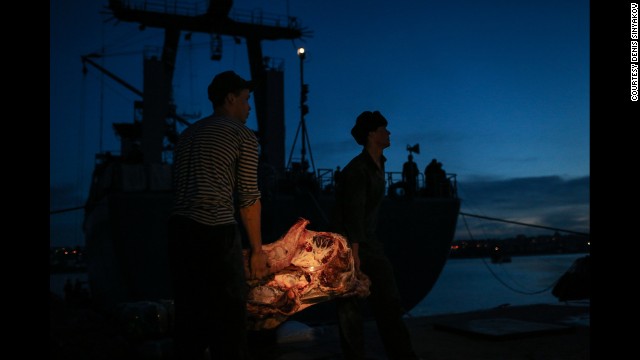 Ukrainian sailors carry meat to their vessel in the Sevastopol harbor on March 5.
Ukrainian sailors carry meat to their vessel in the Sevastopol harbor on March 5.  Riot police stand at the entrance of a regional administrative building during a rally in Donetsk, Ukraine, on March 5.
Riot police stand at the entrance of a regional administrative building during a rally in Donetsk, Ukraine, on March 5.  A Ukrainian police officer gives instructions to members of the media in front of the business class lounge of the Simferopol airport on March 5.
A Ukrainian police officer gives instructions to members of the media in front of the business class lounge of the Simferopol airport on March 5.  Pro-Russia demonstrators wave a Russian flag after storming a regional administrative building in Donetsk on March 5.
Pro-Russia demonstrators wave a Russian flag after storming a regional administrative building in Donetsk on March 5.  Demonstrators break a police barrier as they storm a regional administrative building in Donetsk on March 5.
Demonstrators break a police barrier as they storm a regional administrative building in Donetsk on March 5.  Ukrainian military recruits line up to receive instructions in Kiev's Independence Square on Tuesday, March 4.
Ukrainian military recruits line up to receive instructions in Kiev's Independence Square on Tuesday, March 4.  People stand on the Ukrainian Navy ship Slavutich while it's at harbor in Sevastopol on March 4. Mattresses were placed over the side of the ship to hinder any attempted assault.
People stand on the Ukrainian Navy ship Slavutich while it's at harbor in Sevastopol on March 4. Mattresses were placed over the side of the ship to hinder any attempted assault.  Ukrainian troops watch as a Russian navy ship blocks the entrance of the Ukrainian navy base in Sevastopol on March 4.
Ukrainian troops watch as a Russian navy ship blocks the entrance of the Ukrainian navy base in Sevastopol on March 4.  A woman photographs pro-Russian soldiers guarding Ukraine's infantry base in Perevalnoye, Ukraine, on March 4.
A woman photographs pro-Russian soldiers guarding Ukraine's infantry base in Perevalnoye, Ukraine, on March 4.  U.S. Secretary of State John Kerry, wearing a blue scarf, visits a shrine March 4 for the people who were killed during anti-government protests in Kiev last month.
U.S. Secretary of State John Kerry, wearing a blue scarf, visits a shrine March 4 for the people who were killed during anti-government protests in Kiev last month.  Yuli Mamchun, the commander of the Ukrainian military garrison at the Belbek air base near Sevastopol, salutes on March 4.
Yuli Mamchun, the commander of the Ukrainian military garrison at the Belbek air base near Sevastopol, salutes on March 4.  Russian soldiers stand guard at the Belbek air base on March 4.
Russian soldiers stand guard at the Belbek air base on March 4.  Ukrainian military members march at the Belbek air base on March 4.
Ukrainian military members march at the Belbek air base on March 4.  Russian soldiers fire warning shots to keep back Ukrainian military members at the Belbek air base on March 4.
Russian soldiers fire warning shots to keep back Ukrainian military members at the Belbek air base on March 4.  A Ukrainian airman puts the Ukrainian national flag over the gate of the Belbek air base as they guard what's left under their control on March 4.
A Ukrainian airman puts the Ukrainian national flag over the gate of the Belbek air base as they guard what's left under their control on March 4.  Russian soldiers aim a grenade launcher and machine gun as they guard positions at the Belbek air base on March 4.
Russian soldiers aim a grenade launcher and machine gun as they guard positions at the Belbek air base on March 4.  Ukrainian seamen stand guard on the Ukrainian navy ship Slavutich in the Sevastopol harbor on Monday, March 3.
Ukrainian seamen stand guard on the Ukrainian navy ship Slavutich in the Sevastopol harbor on Monday, March 3.  Oleg, a Ukrainian soldier, kisses his girlfriend, Svetlana, through the gates of the Belbek base entrance on March 3. Tensions are high at the base, where Ukrainian soldiers were standing guard inside the building while alleged Russian gunmen were standing guard outside the gates.
Oleg, a Ukrainian soldier, kisses his girlfriend, Svetlana, through the gates of the Belbek base entrance on March 3. Tensions are high at the base, where Ukrainian soldiers were standing guard inside the building while alleged Russian gunmen were standing guard outside the gates.  Wives of Ukrainian soldiers walk past Russian soldiers to visit their husbands guarding a military base in Perevalnoye on March 3.
Wives of Ukrainian soldiers walk past Russian soldiers to visit their husbands guarding a military base in Perevalnoye on March 3.  A Russian soldier guards an area outside Ukraine's military base in the village of Perevalnoye on March 3.
A Russian soldier guards an area outside Ukraine's military base in the village of Perevalnoye on March 3.  A sailor looks out a window near the entrance to the Ukrainian navy headquarters in Sevastopol on March 3.
A sailor looks out a window near the entrance to the Ukrainian navy headquarters in Sevastopol on March 3.  Armed men in military uniform walk outside a Ukrainian military unit near Simferopol on Sunday, March 2. Hundreds of armed men in trucks and armored vehicles surrounded the Ukrainian base Sunday in Crimea, blocking its soldiers from leaving.
Armed men in military uniform walk outside a Ukrainian military unit near Simferopol on Sunday, March 2. Hundreds of armed men in trucks and armored vehicles surrounded the Ukrainian base Sunday in Crimea, blocking its soldiers from leaving.  Soldiers walk outside a Ukrainian military base in Perevalne, Ukraine, as a local resident waves a Russian flag March 2.
Soldiers walk outside a Ukrainian military base in Perevalne, Ukraine, as a local resident waves a Russian flag March 2.  Demonstrators shout during a rally in Kiev's Independence Square on March 2.
Demonstrators shout during a rally in Kiev's Independence Square on March 2.  Ukrainian soldiers, left, and unidentified gunmen, right, stand at the gate of an infantry base in Perevalnoye on March 2.
Ukrainian soldiers, left, and unidentified gunmen, right, stand at the gate of an infantry base in Perevalnoye on March 2.  Ukrainian soldiers guard a gate of an infantry base in Perevalnoye on March 2.
Ukrainian soldiers guard a gate of an infantry base in Perevalnoye on March 2.  A woman cries during a rally in Independence Square on March 2.
A woman cries during a rally in Independence Square on March 2.  Protesters hold flags of the United States, Germany and Italy during a rally in Independence Square on March 2.
Protesters hold flags of the United States, Germany and Italy during a rally in Independence Square on March 2.  People attend a morning prayer service at Independence Square on March 2.
People attend a morning prayer service at Independence Square on March 2.  A soldier and a truck driver unload bread outside the Ukranian navy headquarters in Sevastopol, Ukraine, on March 2.
A soldier and a truck driver unload bread outside the Ukranian navy headquarters in Sevastopol, Ukraine, on March 2.  Heavily armed troops, displaying no identifying insignia and who were mingling with local pro-Russian militants, stand guard outside a local government building in Simferopol, Ukraine, on March 2.
Heavily armed troops, displaying no identifying insignia and who were mingling with local pro-Russian militants, stand guard outside a local government building in Simferopol, Ukraine, on March 2. 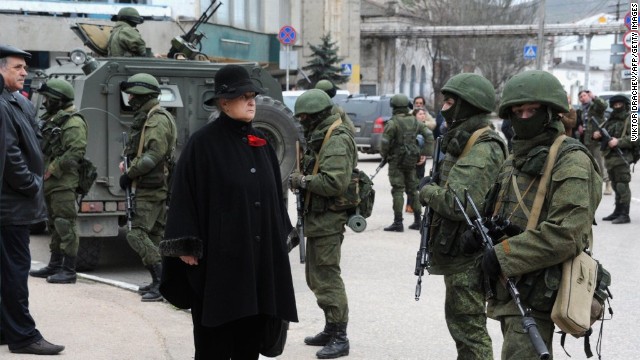 A woman waits in front of unidentified men in military fatigues who were blocking a base of the Ukrainian frontier guard unit in Balaklava, Ukraine, on Saturday, March 1.
A woman waits in front of unidentified men in military fatigues who were blocking a base of the Ukrainian frontier guard unit in Balaklava, Ukraine, on Saturday, March 1. 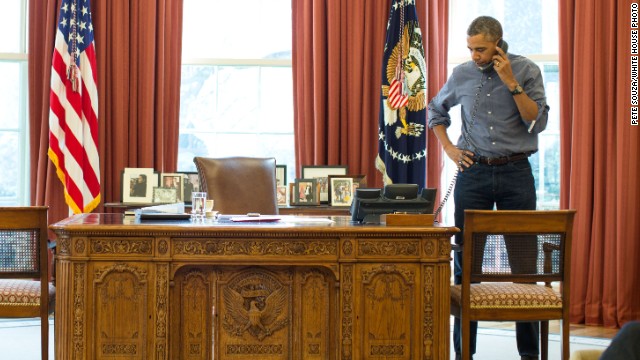 U.S. President Barack Obama, in the Oval Office of the White House, talks on the phone March 1 with Russian President Vladimir Putin.
U.S. President Barack Obama, in the Oval Office of the White House, talks on the phone March 1 with Russian President Vladimir Putin. 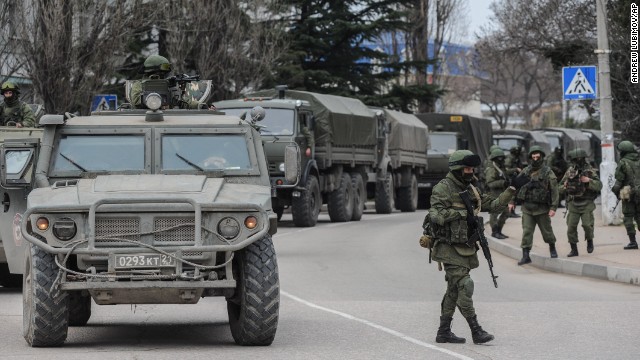 Troops stand guard in Balaklava on March 1.
Troops stand guard in Balaklava on March 1. 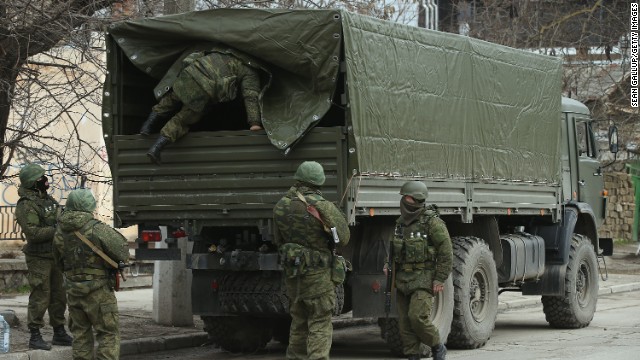 Heavily armed soldiers displaying no identifying insignia maintain watch in Simferopol, Ukraine, on March 1.
Heavily armed soldiers displaying no identifying insignia maintain watch in Simferopol, Ukraine, on March 1. 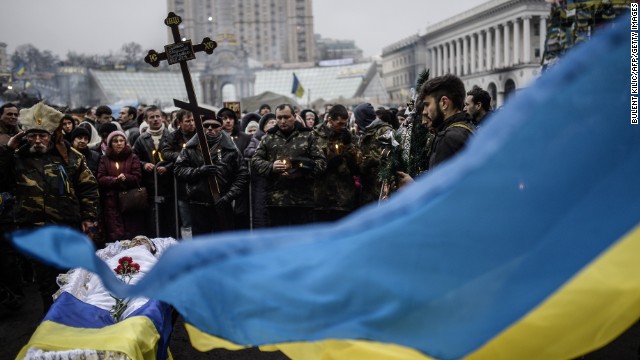 People gather around the coffin of a man who was killed during clashes with riot police in Independence Square.
People gather around the coffin of a man who was killed during clashes with riot police in Independence Square.  Pro-Russian activists hold Russian flags during a rally in the center of Donetsk, Ukraine, on March 1.
Pro-Russian activists hold Russian flags during a rally in the center of Donetsk, Ukraine, on March 1. 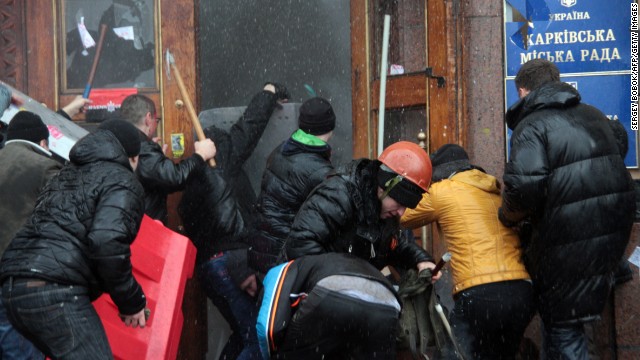 Pro-Russian activists clash with Maidan supporters as they storm the regional government building in Kharkiv, Ukraine, on March 1.
Pro-Russian activists clash with Maidan supporters as they storm the regional government building in Kharkiv, Ukraine, on March 1. 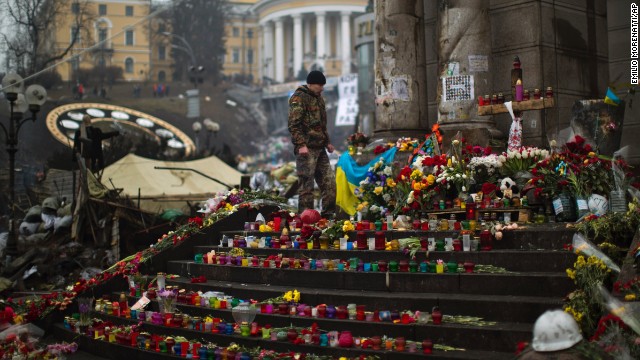 A protester stands at a memorial March 1 for the people killed in clashes at Independence Square.
A protester stands at a memorial March 1 for the people killed in clashes at Independence Square. 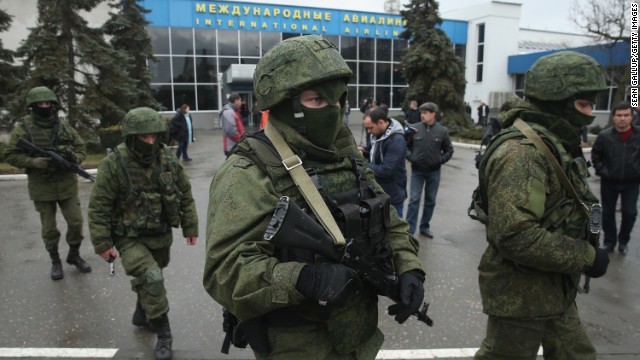 Armed men patrol outside the Simferopol International Airport in Ukraine's Crimea region on Friday, February 28. Simferopol is the regional capital.
Armed men patrol outside the Simferopol International Airport in Ukraine's Crimea region on Friday, February 28. Simferopol is the regional capital. 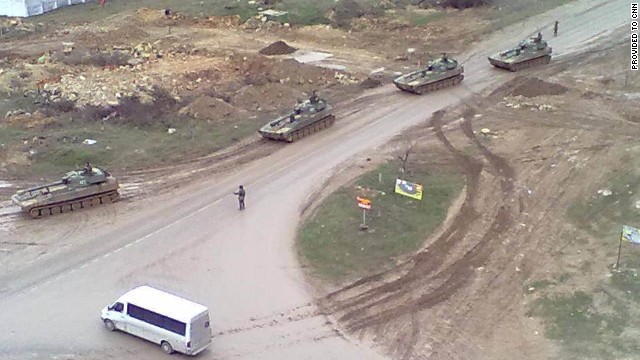 An image provided to CNN by a local resident shows Russian tanks on the move in Sevastopol, Ukraine.
An image provided to CNN by a local resident shows Russian tanks on the move in Sevastopol, Ukraine. 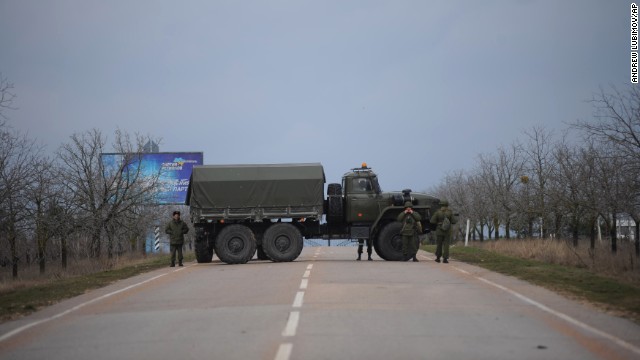 Russian troops block a road February 28 toward the military airport in Sevastopol, Ukraine. The Russian Black Sea Fleet is based at the port city of Sevastopol.
Russian troops block a road February 28 toward the military airport in Sevastopol, Ukraine. The Russian Black Sea Fleet is based at the port city of Sevastopol. 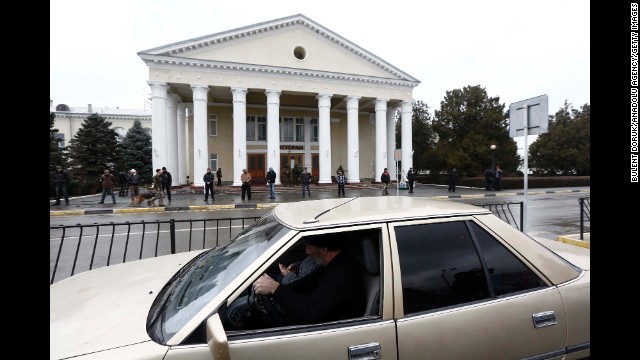 Armed men stand guard in front of a building near the Simferopol airport on February 28.
Armed men stand guard in front of a building near the Simferopol airport on February 28. 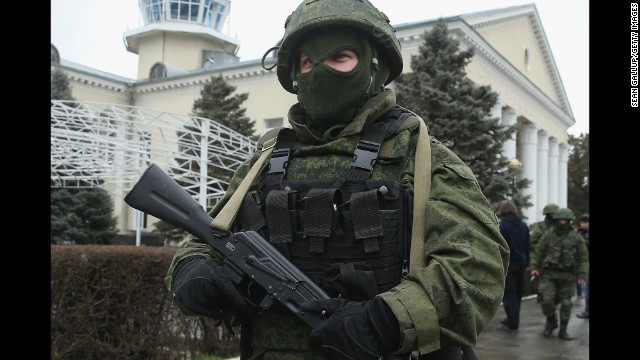 An armed man wearing no identifying insignia patrols outside Simferopol International Airport on February 28.
An armed man wearing no identifying insignia patrols outside Simferopol International Airport on February 28. 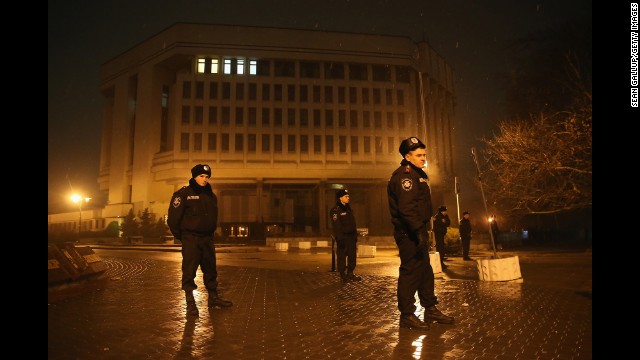 Police stand guard outside the Crimea regional parliament building Thursday, February 27, in Simferopol. Armed men seized the regional government administration building and parliament in Crimea.
Police stand guard outside the Crimea regional parliament building Thursday, February 27, in Simferopol. Armed men seized the regional government administration building and parliament in Crimea. 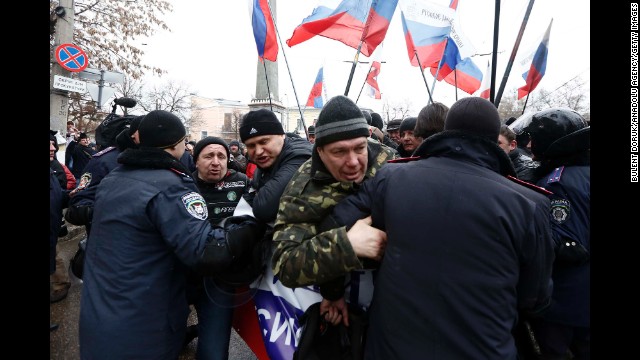 Police intervene as Russian supporters gather in front of the parliament building in Simferopol on February 27.
Police intervene as Russian supporters gather in front of the parliament building in Simferopol on February 27. 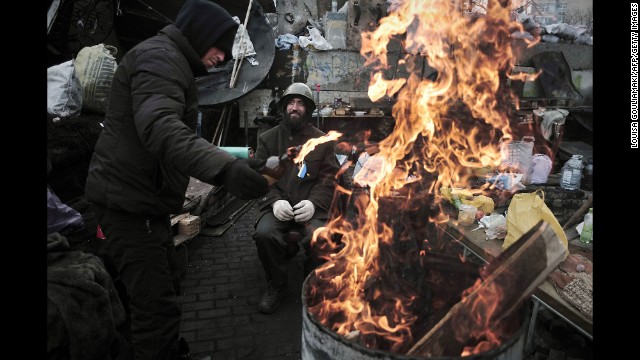 A man adds fuel to a fire at a barricade in Independence Square on February 27. Dozens of people were killed last week during clashes between security forces and protesters.
A man adds fuel to a fire at a barricade in Independence Square on February 27. Dozens of people were killed last week during clashes between security forces and protesters. 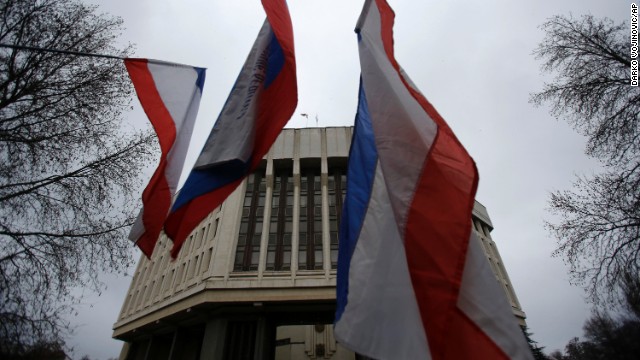 Pro-Russia demonstrators wave Russian and Crimean flags in front of a local government building in Simferopol on February 27.
Pro-Russia demonstrators wave Russian and Crimean flags in front of a local government building in Simferopol on February 27.  Barricades in front of a government building in Simferopol on February 27 hold a banner that reads: "Crimea Russia." There's a broad divide between those who support the pro-Western developments in Kiev and those who back Russia's continued influence in Crimea and across Ukraine.
Barricades in front of a government building in Simferopol on February 27 hold a banner that reads: "Crimea Russia." There's a broad divide between those who support the pro-Western developments in Kiev and those who back Russia's continued influence in Crimea and across Ukraine. 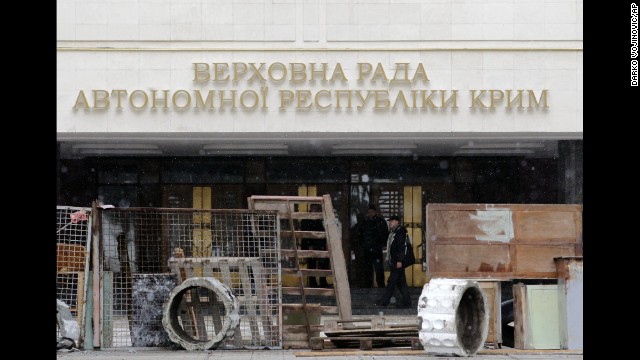 Protesters stand in front of a government building in Simferopol on February 27. Tensions have simmered in the Crimea region since the Ukrainian president's ouster.
Protesters stand in front of a government building in Simferopol on February 27. Tensions have simmered in the Crimea region since the Ukrainian president's ouster. 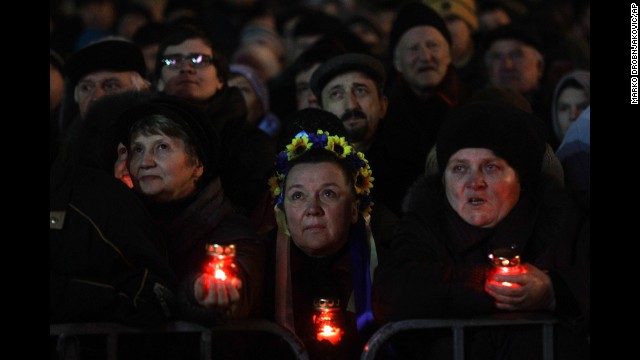 Protesters in support of the president's ouster rally in Independence Square, which has been the center of opposition, on Wednesday, February 26.
Protesters in support of the president's ouster rally in Independence Square, which has been the center of opposition, on Wednesday, February 26. 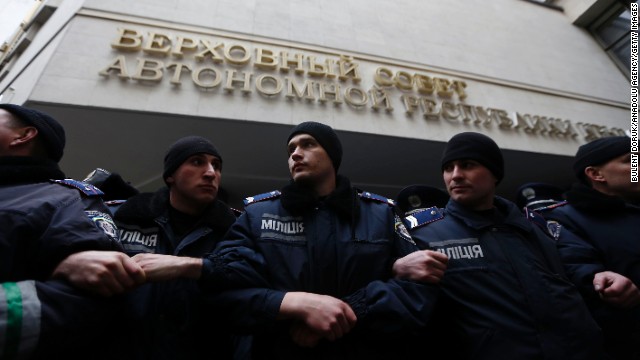 Security forces stand guard during clashes between opposing sides in front of Crimea's parliament building in Simferopol on February 26.
Security forces stand guard during clashes between opposing sides in front of Crimea's parliament building in Simferopol on February 26. 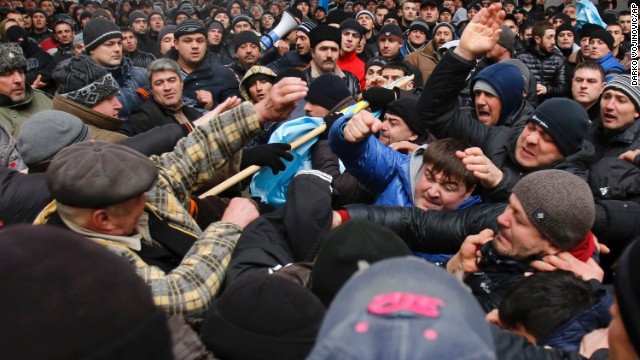 Pro-Russian demonstrators, right, clash with anti-Russian protesters in front of a government building in Simferopol on February 26.
Pro-Russian demonstrators, right, clash with anti-Russian protesters in front of a government building in Simferopol on February 26. 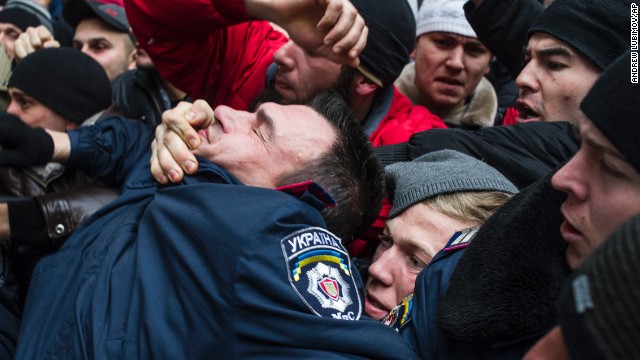 A police officer gets pulled into a crowd of Crimean Tatars in Simferopol on February 26. The Tatars, an ethnic minority group deported during the Stalin era, is rallying in support of Ukraine's interim government.
A police officer gets pulled into a crowd of Crimean Tatars in Simferopol on February 26. The Tatars, an ethnic minority group deported during the Stalin era, is rallying in support of Ukraine's interim government.  A man places flowers at a barricade near Independence Square on February 26.
A man places flowers at a barricade near Independence Square on February 26. 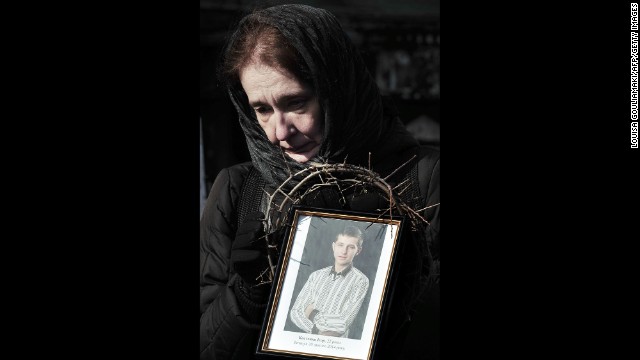 On February 26 in Kiev, A woman holds a photograph of a protester killed during the height of tensions.
On February 26 in Kiev, A woman holds a photograph of a protester killed during the height of tensions. 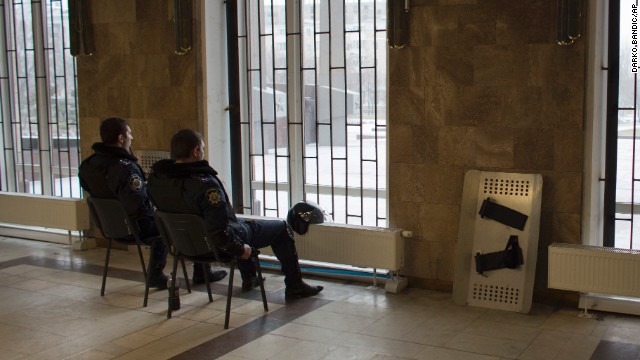 Police guard a government building in Donetsk on February 26.
Police guard a government building in Donetsk on February 26.  Protesters remove a fence that surrounds Ukraine's parliament in Kiev on February 26.
Protesters remove a fence that surrounds Ukraine's parliament in Kiev on February 26. 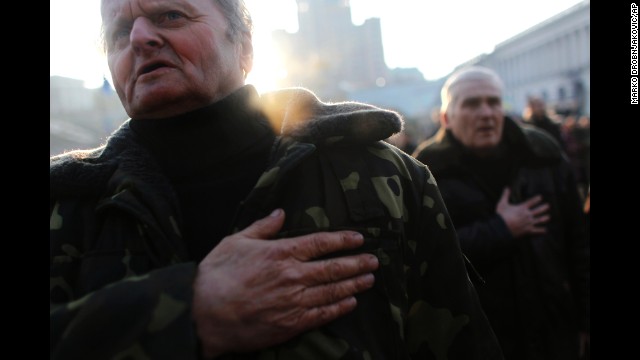 People sing the Ukrainian national anthem at Independence Square on Monday, February 24.
People sing the Ukrainian national anthem at Independence Square on Monday, February 24. 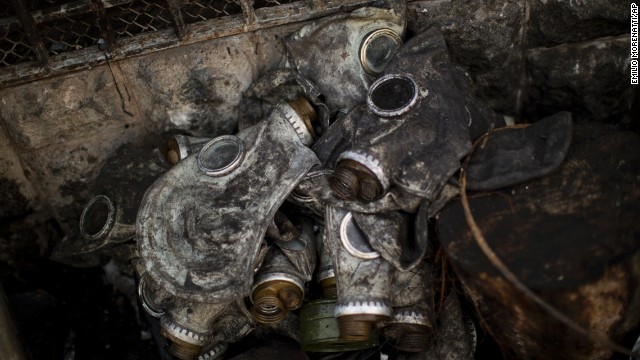 Gas masks used by protesters sit next to a barricade in Independence Square on February 24.
Gas masks used by protesters sit next to a barricade in Independence Square on February 24. 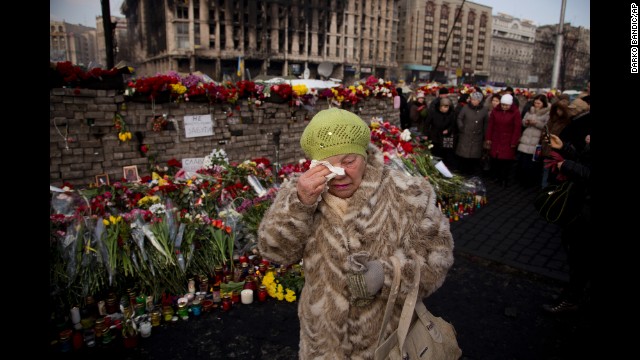 A woman cries February 24 near a memorial for the people killed in Kiev.
A woman cries February 24 near a memorial for the people killed in Kiev. 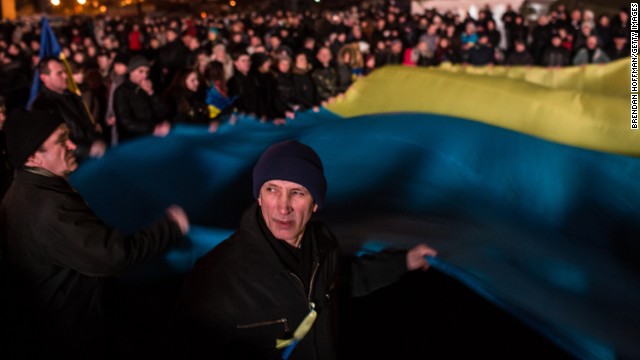 People wave a large Ukrainian flag in Independence Square on Sunday, February 23.
People wave a large Ukrainian flag in Independence Square on Sunday, February 23. 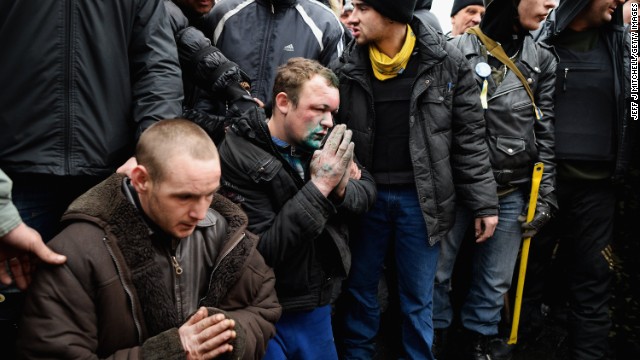 Two pro-government supporters are made to pray February 23 in front of a shrine to dead anti-government protesters.
Two pro-government supporters are made to pray February 23 in front of a shrine to dead anti-government protesters. 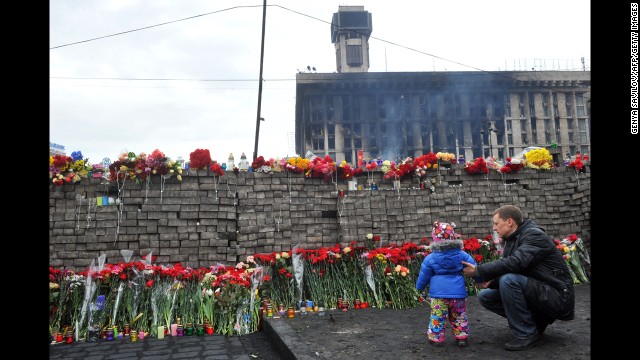 A man and his daughter lay flowers at a memorial for protesters killed in Independence Square.
A man and his daughter lay flowers at a memorial for protesters killed in Independence Square. 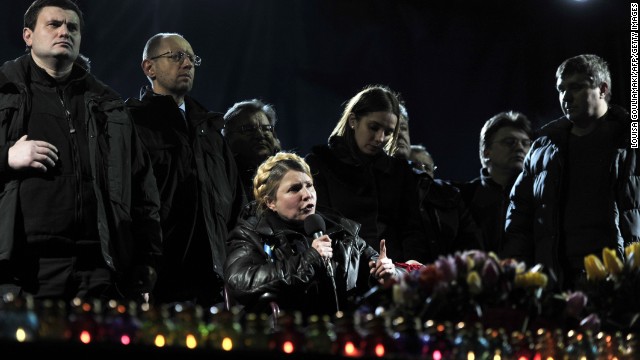 Former Prime Minister Yulia Tymoshenko speaks at Independence Square on Saturday, February 22, hours after being released from prison. Tymoshenko, considered a hero of a 2004 revolution against Yanukovych, was released after 2½ years behind bars.
Former Prime Minister Yulia Tymoshenko speaks at Independence Square on Saturday, February 22, hours after being released from prison. Tymoshenko, considered a hero of a 2004 revolution against Yanukovych, was released after 2½ years behind bars. 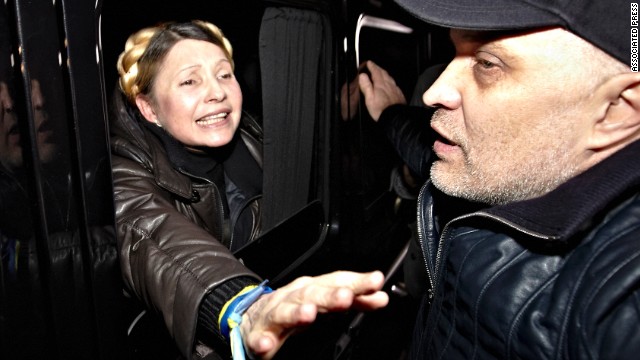 Tymoshenko is greeted by supporters shortly after being freed from prison in Kharkiv on February 22.
Tymoshenko is greeted by supporters shortly after being freed from prison in Kharkiv on February 22. 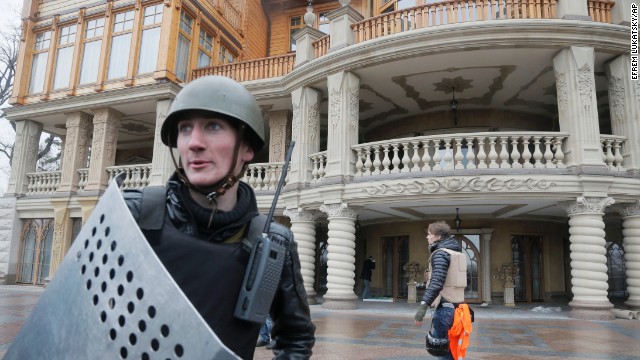 A protester guards the entrance to Yanukovych's abandoned residence outside Kiev on February 22.
A protester guards the entrance to Yanukovych's abandoned residence outside Kiev on February 22. 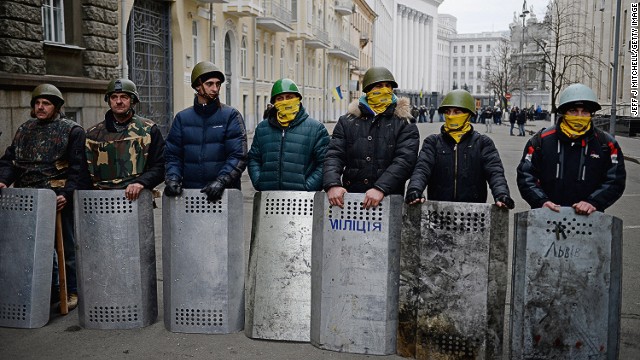 Anti-government protesters guard the streets next to the presidential offices in Kiev on February 22.
Anti-government protesters guard the streets next to the presidential offices in Kiev on February 22.  Anti-government protesters drive a military vehicle in Independence Square on February 22. Many protesters said they wouldn't leave the square until Yanukovych resigned.
Anti-government protesters drive a military vehicle in Independence Square on February 22. Many protesters said they wouldn't leave the square until Yanukovych resigned. 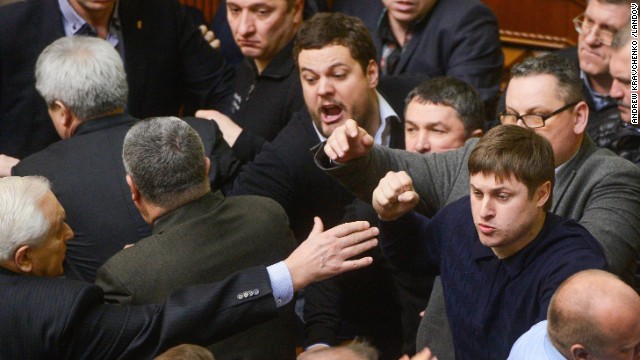 Ukrainian lawmakers argue during a session of Parliament on Friday, February 21.
Ukrainian lawmakers argue during a session of Parliament on Friday, February 21. 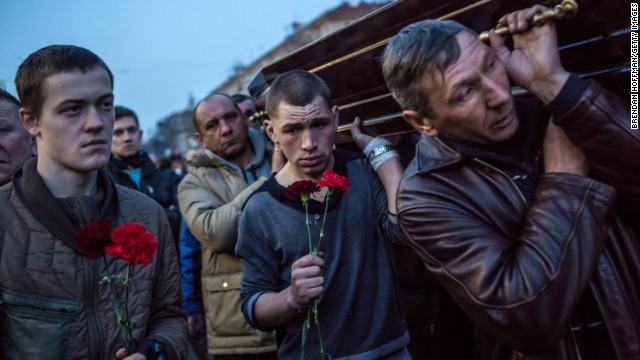 Men in Kiev carry a casket containing the body of a protester killed in clashes with police.
Men in Kiev carry a casket containing the body of a protester killed in clashes with police. 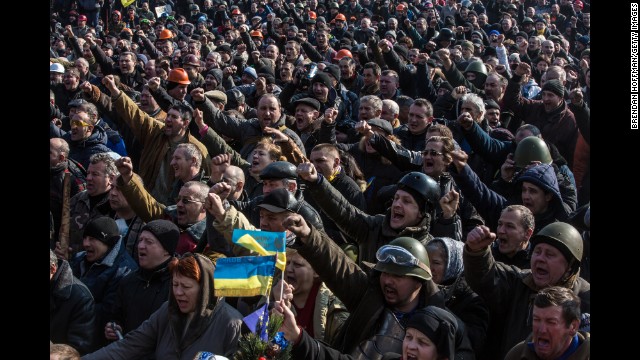 Protesters cheer after news of an agreement between the opposing sides in Kiev on February 21.
Protesters cheer after news of an agreement between the opposing sides in Kiev on February 21.
- Michael Oren: While U.S. focused on mediation in Middle East, Russia acted in Crimea
- He says Russia has influence with Syria and relations with Iran could upend strategy on nukes
- Russia has played its cards well, while U.S. risks being outmaneuvered, he says
- Oren: U.S. should reassert itself in the Middle East and move to protect its allies
Editor's note: Michael Oren is the former Israeli ambassador to the United States. His books include "Power, Faith, and Fantasy: America in the Middle East: 1776 to the Present."
(CNN) -- Condoleezza Rice, secretary of state under President George W. Bush, traveled 23 times to the Middle East in an ultimately unsuccessful attempt to mediate an Israeli-Palestinian accord.
Meanwhile, the Russians invaded Georgia.
President Barack Obama's secretary of state, John Kerry, has shuttled 11 times to the region in search of the same elusive goal. And while American diplomacy was once again focused elsewhere, the Russians invaded Ukraine.
Now, in an effort to curb Russia, the United States is pausing from its efforts to forge an Israeli-Palestinian peace to generate international pressure on the Kremlin. But the pivot may prove impossible, as the issues of Russian expansionism and the stability of the Middle East remain dangerously intertwined.
Late last year, Obama faced a daunting choice. Retaliate militarily for the use of chemical weapons by Syria and anger a war-weary American public or fail to enforce his own red line and severely damage his credibility.
Either way, it seemed, Obama lost. Enter the Russians. As the unswerving supporter of Syrian dictator Bashar al-Assad, Russian President Vladimir Putin alone had the leverage to mediate between Washington and Damascus. Through his cooperation, an arrangement was made for shipping al-Assad's chemical weapons abroad. All sides claimed a victory. And while Syria has so far parted with only a small portion of its chemical arsenal, Obama still cites the agreement as a foreign policy triumph.
Whether in Syria or with Iran, Russia has played its relatively weak strategic hand exceedingly well and is threatening to outmaneuver the United States in the Middle East.
Michael Oren
That success could yet turn sour, however, if Russia backs out of the deal.
In reprisal for punitive actions against Moscow, Putin could enable al-Assad to keep his chemical arms and quietly encourage him to use them. Vividly redrawn, Obama's red line would be flagrantly crossed. The American public would still oppose any military response, and America's enemies in the Middle East could revel in their newly affirmed impunity.
Putin's ability to exploit the Syria civil war to weaken and embarrass the United States pales beside the damage he can inflict on America through Iran.
Russian cooperation has been crucial to maintaining the unity of the permanent Security Council members and Germany -- collectively known by the mathematical name P5+1 -- in levying heavy sanctions on Iran and reaching an interim agreement on its nuclear program.
Held up as an historic achievement by the Obama administration, both the sanctions and the nuclear agreement would be undermined by a Russian decision to pull out of the the P5+1 framework and embark on a separate course of unrestricted trade with Tehran.
While pledging to keep "all options on the table" with Iran, the United States clearly wants to avoid the use of force. But stripped of all nonviolent alternatives, the U.S. would have to resort to military action to prevent Iran from getting the bomb.
 Expert: We need a 'Plan B' for Ukraine
Expert: We need a 'Plan B' for Ukraine  Pro-Russian forces muscle into base
Pro-Russian forces muscle into base  Breaking up with Vladimir Putin
Breaking up with Vladimir Putin  Why Ukraine crisis matters to Mideast
Why Ukraine crisis matters to Mideast Whether in Syria or with Iran, Russia has played its relatively weak strategic hand exceedingly well and is threatening to outmaneuver the United States in the Middle East.
Though no longer able to dispatch the great blue water fleet that once challenged American hegemony in the Eastern Mediterranean, Russia is once again asserting its influence in the region. And the reason is simple. While American policy has concentrated on the soft power of mediation --much of it fruitless -- Russia has invested in the hard power of military assistance and intervention.
America has publicly warned that it may not be able to defend the Jewish state from international boycotts related to the peace process. And Washington has disappointed Israelis and Arab Gulf states by easing sanctions on Iran and striking an interim agreement on its nuclear program.
Russia, by contrast, stands staunchly behind Syria. America's allies worry whether they might stand alone. Russia's allies do not. The advantage, then, goes to Russia.
The erosion can only be stopped -- and Russian expansionism checked -- by the reassertion of American preeminence. One way to do that is to aid moderate Syrian rebels. Another way is to emphasize America's determination to stop Iran from going nuclear by all measures, diplomatic and military, irrespective of Russia's stand. And America must take steps to restore confidence in its dependability as an ally.
This is not the first time that Middle East tensions have been linked to Russian ambitions in the Black Sea. Back in 1853, competition between Russia and the Western powers in Jerusalem triggered a war over Russia's control of the Crimea.
Britain and France eventually stopped Russia, but only at an immense material and human cost.
Today, conversely, the struggle over Crimea could further escalate Middle Eastern conflicts and lead to even greater violence. But that outcome can still be prevented -- not by war, but by reasserting tough American policies in the Middle East, protecting American power in the region and reassuring America's friends.
Follow us on Twitter @CNNOpinion.
Join us on Facebook/CNNOpinion.
The opinions expressed in this commentary are solely those of Michael Oren.
No comments:
Post a Comment